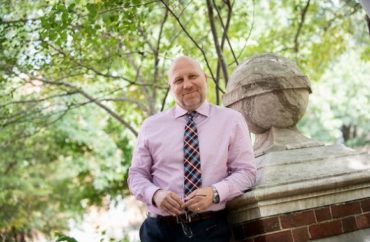
President of new university dedicated to free expression describes plans to build
The recently founded University of Austin is reinventing higher education, with plans that include banning tenure, ditching doctorate requirements for faculty, and hiring the “leanest possible administration.”
The College Fix spoke by phone to President Pano Kanelos about the process of building a new university in the heart of Texas, from staffing to admissions to facilities.
Fourteen months ago, the university’s founders “promised an education without the censorship and enforced ideology present at most traditional universities,” The Fix reported November 2021.
Since then, the university has collected $105 million in funding. The institution was only an “idea” a year ago with no alumni to draw support from, said Kanelos (pictured), former president of St. John’s College in Annapolis.
Just one week after announcing the university, also known as UATX, it received over 3,500 inquiries from prospective professors. It has now received notes of interest from nearly 5,000 people, who Kanelos said represent a broad range of disciplines.
“We have people from medical schools reaching out to us, even though we don’t have a medical school,” he said.
UATX is searching for professors “who are first and foremost committed to the principles we hold of open inquiry, civil discourse, and freedom of conscience,” Kanelos said. The university wants to attract “folks who are committed to the principles and who are going to bring the widest variety of opinions, beliefs, and experience to the table.”
Unlike many universities, UATX will not require full-time faculty to hold doctorates.
“The degree that one holds is not a marker of the quality of their minds or teaching,” Kanelos said. “We’re very interested in people who exhibit the kind of passion for inquiry that Socrates had, and we want to welcome those people to our institution.”
‘One of the things we’re trying to do is redefine prestige’
Even more, UATX will scrap tenure, a process which Kanelos compared to a “hazing” experience.
“The whole tenure process is about faculty hiring, evaluating, promoting, and tenuring their peers,” Kanelos said. Over time, this self-selection facilitates professors representing one side of the political spectrum because “faculty hire their own.”
“The academic freedom of those who might be heterodox or think differently than the majority of faculty is strangled at the front end of this process. They are never considered,” Kanelos said.
UATX has applied for a Certificate of Authority from the Texas Higher Education Coordinating Board. Once approved, which Kanelos expects will be finalized by mid-2023, UATX can grant degrees.
UATX is also undergoing the process for accreditation, which Kanelos said will take at least seven years because the institution must graduate a cohort of students to be eligible.
Though accreditation is not necessary for degree-granting, Kanelos suggested that it would “signal to the world that we have equal standing with every other university.” Additionally, some graduate programs require undergraduate degrees from an accredited institution, and accreditation is required for the university to receive federal funding.
Though it seeks equal standing, UATX is determined to forge a different path than its peers.
“One of the things we’re trying to do is redefine ‘prestige,’” Kanelos said. “Is prestige simply a matter of gaining access to legacy institutions, or is prestige centered around an openness and willingness to be a maverick, to be risk-taking, to be innovative, to be a builder?”
“We don’t want to be Yale,” he said.
The university hosted an inaugural two-week “Forbidden Courses” summer program in Dallas in June 2021, The College Fix reported.
Admissions are not yet open, but the university plans to welcome its first class of approximately 100 undergraduate students in fall 2024, Kanelos said. Within five years, he said he expects a total undergraduate student body of approximately 1,000 students.
Kanelos emphasized that admissions materials will include test scores and GPAs, in contrast to recent decisions by elite schools to ditch test requirements. However, students will also be evaluated by more personal criteria, including their openness to free speech and new ideas.
Free speech policies will be modeled on University of Chicago principles
UATX is developing its formal free speech policies.
Kanelos referred to the “holy trinity of documents” produced by the University of Chicago: the Chicago Free Speech Principles, which provide broad free expression protections to all university community members, the Kalven Report, which prohibits the university from speaking in its official capacity except when its mission is threatened, and the Shils Report, which provides a merit-based framework for academic appointments.
In April the university will host its second annual “First Principles Summit” and review the Chicago documents to craft similar policies.
To continually enforce and evaluate its free speech policies, UATX will have an independent judicial body to review complaints, composed of experts outside the university.
“An institution can’t police itself,” Kanelos said.
UATX has not yet decided if it will require faculty and students to sign a statement affirming their commitment to free expression.
“Personally, the signing of statements doesn’t sit well with me… [It has] the whiff of authoritarianism.” Kanelos said. “But I could be the person who is wrong here.”
Administrative staff will be minimal, tuition will be relatively low
“We plan on having the leanest possible administration that is necessary to function as an institution,” Kanelos said, noting that some elite institutions have as many administrators as students. “A university is a community of students and faculty that should be supported at the fringes by these people we call ‘administrators.’”
He estimates the tuition will be around $30,000 a year, about half of what many elite schools charge.
“Having a lower tuition actually compels the institution to spend its resources prudently,” Kanelos said.
“When you’re paying these inflated tuitions, the added money is not going to your academic experience. It is going to the administration.”
UATX eyes European-style university town
The university will initially lease buildings in downtown Austin, but it has secured undeveloped “ranch land” and hired an architect to build a campus, which Kanelos estimates will require at least four years before being occupied, he said. Kanelos described the campus grounds as “beautiful, river-front land” approximately fifteen miles outside downtown Austin.
UATX hired architect Léon Krier as the campus grounds master planner. Krier’s “philosophy is to approach architecture and planning through classical principles and create humane, walkable, beautiful communities,” according to Kanelos.
He emphasized UATX wants to build a university town, like Oxford or Cambridge, with “narrow streets” and a mix of “residential” and “commercial” buildings.
American higher education has “isolated itself from the larger community, and campuses in particular create these bubbles,” Kanelos said. He thinks it is a “healthier approach” for the university to be integrated with the local community so that the “life of the community and the life of the university are constantly cross-pollinating” and students can live in the real world.
“We’re going to treat students as adults,” he said.
MORE: University of Austin poised to restore academic ideals, but critics want mission clarified
IMAGE: St. John’s College





Please join the conversation about our stories on Facebook, Twitter, Instagram, Reddit, MeWe, Rumble, Gab, Minds and Gettr.